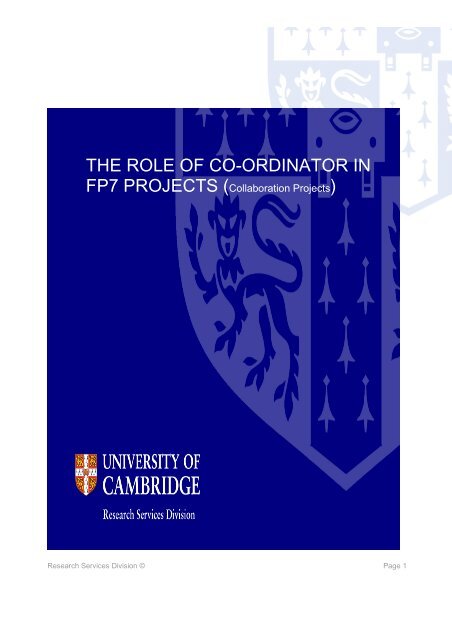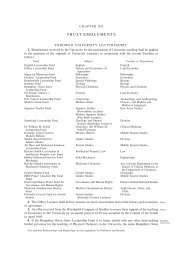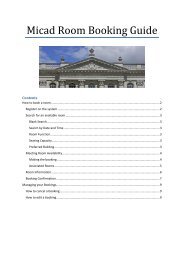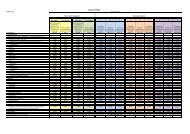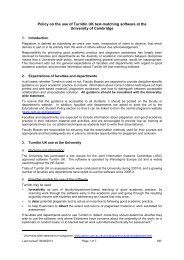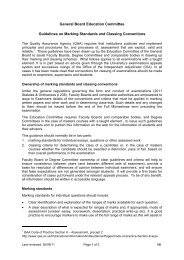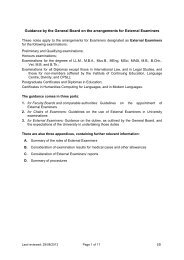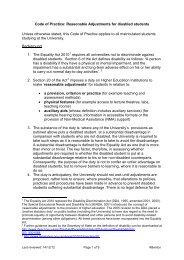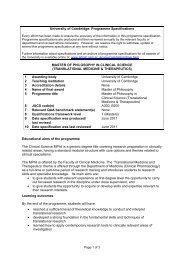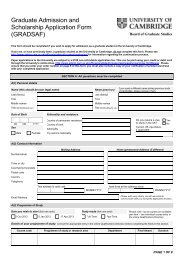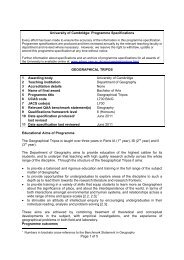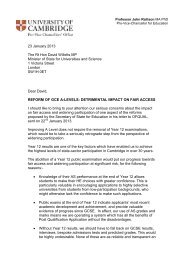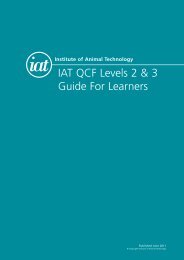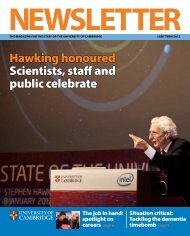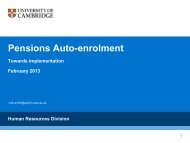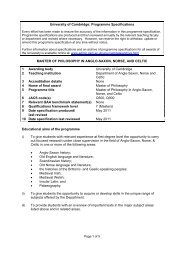FP7 Coordinator Guide - the University Offices - University of ...
FP7 Coordinator Guide - the University Offices - University of ...
FP7 Coordinator Guide - the University Offices - University of ...
Create successful ePaper yourself
Turn your PDF publications into a flip-book with our unique Google optimized e-Paper software.
THE ROLE OF CO-ORDINATOR IN<br />
<strong>FP7</strong> PROJECTS (Collaboration Projects)<br />
Research Services Division © Page 1
RSD has a dedicated team <strong>of</strong> experts ready to advise you on all stages <strong>of</strong> your<br />
involvement with <strong>the</strong> EC research funding schemes -- from learning about potential<br />
opportunities to checking your application, budgeting your grant bid, putting toge<strong>the</strong>r your<br />
consortium agreement, activating your grant on <strong>the</strong> <strong>University</strong> system and assisting in<br />
post-award financial management.<br />
To prepare and guide you in your role as a coordinator in a EU funded <strong>FP7</strong> Project, RSD,<br />
with <strong>the</strong> help <strong>of</strong> several experienced Cambridge coordinators, has assembled this<br />
document which we hope will provide you with <strong>the</strong> necessary information and tools<br />
available from RSD and our website (http://www.rsd.cam.ac.uk/ec/Default.aspx)<br />
We would also like to thank Marie Dixon, Centre Administrator, Centre for Speech,<br />
Language and <strong>the</strong> Brain Department <strong>of</strong> Experimental Psychology, for her contribution to<br />
<strong>the</strong> discussion <strong>of</strong> this <strong>Guide</strong>.<br />
Research Services Division (RSD)<br />
<strong>University</strong> <strong>of</strong> Cambridge<br />
October 2007<br />
Research Services Division © Page 2
CONTENTS<br />
Definition <strong>of</strong> terms ..................................................................................................................................5<br />
Accession Form (“Form A”) ......................................................................................................................5<br />
Beneficiary ...............................................................................................................................................5<br />
Consortium...............................................................................................................................................5<br />
<strong>Coordinator</strong> ..............................................................................................................................................5<br />
Legal entity...............................................................................................................................................5<br />
Participant................................................................................................................................................5<br />
Third party................................................................................................................................................6<br />
The main parties involved in a consortium............................................................................................6<br />
<strong>Coordinator</strong> ..............................................................................................................................................6<br />
Project Officer ..........................................................................................................................................6<br />
Participants/Beneficiaries/Consortium Partners ........................................................................................6<br />
Third Parties.............................................................................................................................................6<br />
Calls - to think about before you consider <strong>FP7</strong> co-operation projects.................................................7<br />
The Proposal – to consider before you start writing.............................................................................7<br />
Evaluation - to be considered when writing <strong>the</strong> application.................................................................7<br />
How to apply ...........................................................................................................................................8<br />
What do you focus on when applying for <strong>FP7</strong> funding .........................................................................8<br />
Consortium..............................................................................................................................................9<br />
Budgets ...................................................................................................................................................9<br />
Role <strong>of</strong> <strong>the</strong> Co-ordinator (<strong>the</strong> single point <strong>of</strong> contact between partners and <strong>the</strong> EU)........................10<br />
Role <strong>of</strong> a partner ...................................................................................................................................11<br />
RESEARCH SERVICES DIVISION (RSD) – GENERAL INFORMATION ....................................................12<br />
Authorised Signatories for EC Documents ..............................................................................................12<br />
<strong>University</strong>’s website................................................................................................................................12<br />
APPLICATIONS INFORMATION ................................................................................................................13<br />
EPSS......................................................................................................................................................13<br />
pFACT....................................................................................................................................................13<br />
Letters <strong>of</strong> Intent.....................................................................................................................................14<br />
CONTRACT NEGOTIATION INFORMATION .............................................................................................15<br />
Main contracts links..............................................................................................................................15<br />
Proposal Stage (Section B) ..................................................................................................................15<br />
Consortium Agreement ........................................................................................................................15<br />
Accession Form (Form A).....................................................................................................................16<br />
Subcontracts.........................................................................................................................................16<br />
Amendments .........................................................................................................................................17<br />
FINANCIAL - POST AWARD SERVICES (PAS) INFORMATION ...............................................................18<br />
Distribution <strong>of</strong> Funding (‘Community Financial Contribution’)...........................................................18<br />
Reporting...............................................................................................................................................18<br />
Research Services Division © Page 3
Monitoring compliance <strong>of</strong> <strong>the</strong> beneficiaries (Grant Agreement, Annex II, Article 2)..........................19<br />
ANNEX 1- SOME USEFUL INFORMATION FOR EPSS REGISTRATION/PROPOSALS ...........................20<br />
ANNEX 2 - MAIN SOURCES OF INFORMATION.......................................................................................21<br />
Cordis ....................................................................................................................................................21<br />
Key research Directorate-General websites............................................................................................21<br />
UK Research Office (UKRO) ..................................................................................................................22<br />
O<strong>the</strong>r useful links ...................................................................................................................................22<br />
SUMMARY OF CO-ORDINATOR RESPONSIBILITIES TABLE ................................................................23<br />
SUMMARY OF PARTNER RESPONSIBILITIES TABLE ...........................................................................26<br />
Research Services Division © Page 4
GENERAL INFORMATION<br />
Definition <strong>of</strong> terms<br />
*For ease <strong>of</strong> reference, please note <strong>the</strong> definitions below before you proceed with <strong>the</strong><br />
document*<br />
Accession Form (“Form A”)<br />
By signing <strong>the</strong> A Form in three originals, countersigned by <strong>the</strong> <strong>Coordinator</strong>, a participant becomes a<br />
‘beneficiary’ and assumes <strong>the</strong> rights and obligations established by <strong>the</strong> grant agreement with effect<br />
from <strong>the</strong> date on which <strong>the</strong> grant agreement enters into force.<br />
Beneficiary<br />
There is still some confusion in <strong>the</strong> EC terminology. A beneficiary seems to be a participant who<br />
signs an Accession Form to <strong>the</strong> Grant Agreement, see above, and receives EC funding under that<br />
Grant Agreement. However, all guidance documents will refer to ‘participants’ to describe <strong>the</strong><br />
consortium partners.<br />
Consortium<br />
A consortium is <strong>the</strong> term used to describe all <strong>of</strong> <strong>the</strong> participants in <strong>the</strong> same project.<br />
<strong>Coordinator</strong><br />
The coordinator has a very specific role amongst <strong>the</strong> participants in a given project. It signs <strong>the</strong><br />
Grant Agreement directly with <strong>the</strong> EC and has to has to secure <strong>the</strong> Form A’s from <strong>the</strong> o<strong>the</strong>r<br />
beneficiaries. An important task for <strong>the</strong> coordinator is to "monitor <strong>the</strong> compliance by participants<br />
[beneficiaries] with <strong>the</strong>ir obligations under this grant agreement" (Article II.2.3.e <strong>of</strong> GA), which<br />
includes <strong>the</strong> participants' obligations regarding IPR, dissemination and use issues.<br />
CPF, GPF, NEF<br />
The Commission is gradually phasing out <strong>the</strong> use <strong>of</strong> <strong>the</strong> Grant Preparation Forms (GPF), in <strong>FP7</strong><br />
known as Contract Preparation Forms (CPF) in favour <strong>of</strong> a new online system, referred to as<br />
Negotiation Forms (NEF). At <strong>the</strong> beginning <strong>of</strong> <strong>the</strong> negotiation process, <strong>the</strong> co-ordinator will receive<br />
an online log-in, password and URL address for <strong>the</strong> NEF. Only one username and password is<br />
given to each consortium. It is understood that paper versions <strong>of</strong> <strong>the</strong> form may still need to be<br />
signed and submitted to <strong>the</strong> Commission. Because NEF is being introduced gradually, different<br />
project <strong>of</strong>ficers will use different mechanisms for project negotiation for <strong>the</strong> time being. It is<br />
important to underline that <strong>the</strong> instructions <strong>of</strong> <strong>the</strong> EC project <strong>of</strong>ficer are key to this.<br />
Legal entity<br />
Only a legal entity as defined in <strong>the</strong> Rules for Participation (e.g. company, <strong>University</strong>, research<br />
centre, individual) can become a participant in a <strong>FP7</strong> project. A department (or faculty, institute<br />
etc.) which does not have legal status cannot.<br />
Participant<br />
A participant is a legal entity taking part in an indirect action (i.e. a specific <strong>FP7</strong> project undertaken<br />
by one or more participants) and having <strong>the</strong> rights and obligations defined by <strong>the</strong> Grant Agreement<br />
entered into with <strong>the</strong> European Commission (“EC”) on behalf <strong>of</strong> <strong>the</strong> European Community. For <strong>the</strong><br />
Research Services Division © Page 5
sake <strong>of</strong> simplicity, hereafter <strong>the</strong> word "participant(s)" will be used to indicate those participating in a<br />
given project.<br />
Third party<br />
The term third party is used to describe a legal entity which does not participate in <strong>the</strong> same project<br />
as a beneficiary, even though such third party may participate in ano<strong>the</strong>r <strong>FP7</strong> project.<br />
<strong>Coordinator</strong><br />
The main parties involved in a consortium<br />
• The lead consortium partner, one beneficiary who has extra responsibility (but not<br />
necessarily extra rights) and will carry <strong>the</strong> costs <strong>of</strong> preparing <strong>the</strong> proposal.<br />
• Responsible for passing on pre-financing in accordance with <strong>the</strong> Grant Agreement (and as<br />
agreed by beneficiaries in consortium agreement).<br />
• Responsible for reporting to <strong>the</strong> Commission (finances, payments, task progress…), i.e. <strong>the</strong><br />
Project Officer (see below).<br />
• Has to monitor <strong>the</strong> compliance by o<strong>the</strong>r beneficiaries with <strong>the</strong>ir obligations under <strong>the</strong> Grant<br />
Agreement.<br />
• Must report on interest gained in <strong>the</strong>ir account from EC pre-financing.<br />
Project Officer<br />
• The EC's representative.<br />
• Appointed by <strong>the</strong> EC to a project at <strong>the</strong> start <strong>of</strong> grant agreement negotiation stage.<br />
• Responsible for project negotiation towards final grant agreement and start.<br />
• Responsible for monitoring, interim reporting, and processing <strong>of</strong> finances.<br />
• Responsible for signing <strong>of</strong>f project.<br />
Participants/Beneficiaries/Consortium Partners<br />
• Organisations (companies, Universities, research centres etc) signed up to <strong>the</strong> Grant<br />
Agreement by Form A.<br />
• Each beneficiary has consortium and individual responsibilities.<br />
• Beneficiaries should have <strong>the</strong> capacity to do <strong>the</strong>ir part in <strong>the</strong> project (as <strong>the</strong>y signed up to it).<br />
• Must be seen to be working toge<strong>the</strong>r.<br />
• Responsible for managing own performance and finances - including declaring receipts.<br />
• Responsible for <strong>the</strong> performance <strong>of</strong> any subcontractors attached to <strong>the</strong>m.<br />
Third Parties<br />
• Organisations which are not considered beneficiaries (i.e. which are not signed up to <strong>the</strong><br />
Grant Agreement).<br />
• Must be identified in project negotiations, or raised with Project Officer subsequently.<br />
• Has to make some contribution to <strong>the</strong> project.<br />
• Can charge costs under certain conditions, o<strong>the</strong>rwise resources provided ‘free <strong>of</strong> charge’<br />
may be viewed as a 'receipt'.<br />
Research Services Division © Page 6
• Subcontractors are one type <strong>of</strong> third party but a third party is not necessarily a<br />
subcontractor.<br />
• Can ei<strong>the</strong>r be (a) a party making resources available (does not perform work) or (b) a party<br />
that does part <strong>of</strong> <strong>the</strong> work (subcontractor).<br />
Calls - to think about before you consider <strong>FP7</strong> co-operation projects<br />
• You should not try to ‘shoehorn’ your project into <strong>the</strong> call if it doesn’t fit. Co-operation projects<br />
are activity led to answer <strong>the</strong> specific questions outlined in <strong>the</strong> call - <strong>the</strong>se topics are predefined<br />
for <strong>the</strong> whole <strong>of</strong> <strong>FP7</strong>. Each proposal is evaluated to determine if it matches <strong>the</strong> call<br />
before it is reviewed and can be rejected at this first stage. If you want more flexible funding,<br />
apply to <strong>the</strong> annual ERC call.<br />
• Calls will happen throughout <strong>the</strong> lifetime <strong>of</strong> <strong>FP7</strong> (7 years) – please see <strong>the</strong> following link for <strong>the</strong><br />
list <strong>of</strong> all <strong>FP7</strong> open calls for proposals:<br />
http://cordis.europa.eu/fp7/dc/index.cfm?fuseaction=UserSite.<strong>FP7</strong>OpenCallsPage<br />
• Individual calls will have specific conditions (e.g. what type <strong>of</strong> partners must be in consortium,<br />
how <strong>the</strong> money can be used) so must be studied very carefully.<br />
• The research must be very interdisciplinary and each partner must have a unique but<br />
interconnected work package so <strong>the</strong> problem is addressed from many different angles.<br />
• Be aware that <strong>the</strong> EC prefer smaller consortia. A large number <strong>of</strong> partners make <strong>the</strong><br />
management <strong>of</strong> <strong>the</strong> project difficult.<br />
• Please be aware that management <strong>of</strong> <strong>the</strong> project is a core task and CANNOT BE<br />
SUBCONTRACTED<br />
• Please be aware that any pre-award expenditure will not be considered an eligible cost. Each<br />
partner, including <strong>the</strong> coordinator, shall be responsible for its own costs in <strong>the</strong> preparation for<br />
<strong>the</strong> proposal.<br />
The Proposal – to consider before you start writing<br />
• What are <strong>the</strong> main objectives (objectives must be measurable)? Does it fit <strong>the</strong> topic described<br />
in <strong>the</strong> call?<br />
• How is it unique?<br />
• Whose problem does this solve?<br />
• Why does it have to be your consortium working on this? Why can’t o<strong>the</strong>rs do it?<br />
• Which consortium member will provide which skills?<br />
• How will you know if you have succeeded - must be able to demonstrate research deliverables.<br />
Think about how <strong>the</strong> co-ordinator will monitor <strong>the</strong> work and how successful it is.<br />
• How will measure your progress? Need to include clear milestones when doing <strong>the</strong> planning.<br />
Evaluation - to be considered when writing <strong>the</strong> application<br />
• Evaluation is based on three categories, each marked out <strong>of</strong> 5 with equal value:<br />
Research Services Division © Page 7
• Scientific content (concept, quality <strong>of</strong> <strong>the</strong> objectives which must be measurable,<br />
advances, methods and work plan. Must include a Gantt Chart)<br />
• Implementation (management structure - defining <strong>the</strong> role <strong>of</strong> <strong>the</strong> co-ordinator,<br />
procedures, consortium and <strong>the</strong> details <strong>of</strong> <strong>the</strong> consortium agreement, resources and<br />
how <strong>the</strong>y will be allocated between members)<br />
• Potential Impact (expected impact particularly at European level when compared to <strong>the</strong><br />
objectives <strong>of</strong> <strong>the</strong> call, dissemination and/or exploitation <strong>of</strong> results between <strong>the</strong><br />
consortium and beyond, management <strong>of</strong> IP, publication plan is essential).<br />
• Minimum threshold to pass is 3/5 in each section with an overall score <strong>of</strong> 10/15. If <strong>the</strong> call is<br />
oversubscribed <strong>the</strong> threshold may increase to 4/5 or 5/5. Most proposals score well on content<br />
so focus on implementation and impact.<br />
• Also need to include section on ethical issues and gender issues (including promoting gender<br />
equality).<br />
For more information on <strong>the</strong> evaluation process, please download <strong>the</strong> ‘<strong>Guide</strong> for applicants’<br />
available on Cordis. (http://cordis.europa.eu/fp7/dc/index.cfm?fuseaction=UserSite.<strong>FP7</strong>CallsPage)<br />
• Find a call that your research will fit into.<br />
How to apply<br />
• Build <strong>the</strong> consortium with appropriate partners.<br />
• Have an Outline Proposal meeting – co-ordinator organises meeting where all partners meet,<br />
allocate activities and develop a 1-page outline proposal. At this stage need to plan:<br />
• scientific content as a series <strong>of</strong> work packages (proposal requires each activity/work<br />
package to be written up separately). It is very important that partners work toge<strong>the</strong>r at<br />
this stage to illustrate <strong>the</strong> interactions between individual work packages - <strong>the</strong>y must not<br />
be standalone units – and that <strong>the</strong> activities match <strong>the</strong> work programme described in <strong>the</strong><br />
call.<br />
• implementation management, consortium agreement and budget.<br />
• impact, exploitation, how <strong>the</strong> research can be applied/disseminated.<br />
• Use <strong>the</strong> ‘<strong>Guide</strong> for Applicants’ very carefully.<br />
• Co-ordinator pulls toge<strong>the</strong>r all contributions and budgets into a well-integrated application,<br />
completes all sections and submits using EPSS.<br />
• Start date should be given as 9-11 months after <strong>the</strong> closing date.<br />
• Deadline is usually three months after publication <strong>of</strong> <strong>the</strong> call.<br />
What do you focus on when applying for <strong>FP7</strong> funding<br />
• Must contribute towards and enhance <strong>the</strong> competitiveness <strong>of</strong> <strong>the</strong> EU.<br />
• Must target <strong>the</strong> specific objective in a clearly defined overall approach with a fixed overall work<br />
plan.<br />
Research Services Division © Page 8
• Duration must be 2-5 years, depending on specific call rules.<br />
• Must lead to an advance in <strong>the</strong> state-<strong>of</strong>-<strong>the</strong>-art in <strong>the</strong> research area.<br />
• Must not repeat any research which is already underway.<br />
• Must have a market or strategic impact in Europe.<br />
• Must not be able to do all <strong>of</strong> this research in-house - <strong>the</strong> collaboration must be necessary and<br />
<strong>the</strong> research must be interdisciplinary.<br />
• Must indicate how <strong>the</strong> proposal meets national legal and ethical requirements <strong>of</strong> <strong>the</strong> country in<br />
which <strong>the</strong> research is performed.<br />
Consortium<br />
• UKRO recommend being a partner on a consortium before acting as a co-ordinator due to <strong>the</strong><br />
extra work involved.<br />
• The absolute minimum number <strong>of</strong> eligible counties in <strong>the</strong> consortium is 3 but it is very strongly<br />
recommended that <strong>the</strong>re are more: 10-15 for large scale projects, 6-15 for small and medium<br />
scale projects. Each member will have <strong>the</strong>ir own work package and look at <strong>the</strong> research<br />
problem from a different angle.<br />
• Consortiums are best made <strong>of</strong> partners who know each o<strong>the</strong>r already.<br />
• If it is difficult to find enough partners, you can consider adding people who will be useful but<br />
who will make a minimum contribution (and will have a small work package).<br />
• Must be able to demonstrate in <strong>the</strong> proposal that <strong>the</strong> consortium will work toge<strong>the</strong>r well and all<br />
are committed to <strong>the</strong> aims <strong>of</strong> <strong>the</strong> project.<br />
• Need to demonstrate that <strong>the</strong> partners have <strong>the</strong> capacity and resources to do <strong>the</strong> work <strong>the</strong>y<br />
agree to.<br />
• Must demonstrate that all partners will conform to <strong>the</strong> voluntary European Charter for<br />
Researchers Code <strong>of</strong> Conduct for <strong>the</strong> Recruitment <strong>of</strong> Researchers.<br />
• UK Research Office have a meeting room in Brussels which is available free <strong>of</strong> charge for<br />
consortium meetings<br />
Budgets<br />
• Check maximum budget for <strong>the</strong> particular call you are responding to.<br />
• Do budget very carefully for each partner. The approach would ideally be a ‘bottom up’<br />
approach i.e. how much is this going to cost ra<strong>the</strong>r than a ‘top down’, i.e. how much am I going<br />
to get. The share <strong>of</strong> costs must not be a simple split between each partner - if it looks like no<br />
thought has gone into <strong>the</strong> budget it will not get funded. Partners need to be well-balanced in<br />
terms <strong>of</strong> <strong>the</strong>ir budget requirements.<br />
• The budget must be competitively priced and not inflated.<br />
• FP6 cost models have been abolished in <strong>FP7</strong>. Partners will need to use ei<strong>the</strong>r <strong>the</strong>ir real indirect<br />
costs, a standard flat (20%) or a transitional flat rate (60%).<br />
• For public bodies <strong>FP7</strong> reimburses 75% <strong>of</strong> direct costs for RTD, 50% for demonstration and<br />
100% for o<strong>the</strong>r activities Management costs should be about 7% <strong>of</strong> <strong>the</strong> overall budget.<br />
Research Services Division © Page 9
• It is possible to employ somebody within your department to assist with <strong>the</strong> management <strong>of</strong> <strong>the</strong><br />
project. Their time will be charged under <strong>the</strong> management costs.<br />
• It is essential that accurate timesheets must be kept for all employees on <strong>the</strong> project for<br />
reporting and audit purposes.<br />
• You must make adequate provision for <strong>the</strong> costs involved in running <strong>the</strong> project. Please be<br />
aware that management <strong>of</strong> <strong>the</strong> project is a core task and CANNOT BE SUBCONTRACTED.<br />
Any management costs paid to a management agency or similar are likely to be ruled ineligible<br />
by <strong>the</strong> Commission, and <strong>the</strong> Department will <strong>the</strong>n have to find <strong>the</strong> funds from its own resources<br />
Role <strong>of</strong> <strong>the</strong> Co-ordinator (<strong>the</strong> single point <strong>of</strong> contact between partners and <strong>the</strong> EU)<br />
1. Identify a suitable call.<br />
2. Identify and approach suitable partners.<br />
3. Arrange and chair <strong>the</strong> initial consortium meeting where <strong>the</strong> 1 page proposal is drawn up, <strong>the</strong> rough<br />
budget decided and <strong>the</strong> work packages outlined. Ensure that <strong>the</strong> collaborations between work packages<br />
and <strong>the</strong> management structure <strong>of</strong> <strong>the</strong> consortium are discussed.<br />
4. Distribute <strong>the</strong> final 1 page summary amongst partners and ask <strong>the</strong>m to produce a detailed description <strong>of</strong><br />
<strong>the</strong> work packages <strong>the</strong>y are involved in and a complete budget.<br />
5. Agree with partners <strong>the</strong> details <strong>of</strong> <strong>the</strong> consortium agreement which should outline <strong>the</strong> internal<br />
organisation <strong>of</strong> <strong>the</strong> consortium, <strong>the</strong> distribution <strong>of</strong> <strong>the</strong> EU financial contribution, rules on dissemination<br />
including intellectual property rights and how internal disputes will be settled.<br />
6. Assimilate all <strong>the</strong> work package descriptions into 1 complete integrated proposal following <strong>the</strong> guidelines<br />
outlined below, ensuring that this looks like a fully collaborative project with lots <strong>of</strong> interlinking elements<br />
(Section B1 proposal - max 20 pages, Section B2 implementation - max 12 pages, Section B3 impact -<br />
max 10 pages, Section B4 ethical & gender issues - no page limit, Section B5 gender aspects - max 1<br />
page). Most <strong>of</strong> sections B2-B5 are written by <strong>the</strong> co-ordinator – see annex for format.<br />
7. Assimilate all <strong>the</strong> budgets into one budget for <strong>the</strong> application form & produce a pFACT.<br />
8. Complete and submit <strong>the</strong> application form on EPSS (Section B as outlined above plus Section A<br />
including abstract). Give each partner access so <strong>the</strong>y can complete <strong>the</strong>ir own Section A2.<br />
9. At <strong>the</strong> first signs <strong>of</strong> <strong>the</strong> grant being awarded, be responsible for starting <strong>the</strong> negotiation phase for <strong>the</strong><br />
consortium agreement through <strong>the</strong> <strong>University</strong>’s Research Services Division (RSD).<br />
10. If awarded, be responsible for <strong>the</strong> contract negotiation stage (<strong>of</strong> <strong>the</strong> Grant Agreement). Distribute Form<br />
A’s to <strong>the</strong> Grant Agreement to each partner through <strong>the</strong> <strong>University</strong>’s Research Services Division (RSD).<br />
Stay involved in contract negotiations through to <strong>the</strong> full execution <strong>of</strong> <strong>the</strong> consortium agreement and<br />
Form A’s..<br />
11. Distribute funding to partners according to <strong>the</strong>ir budget and expenditure in <strong>the</strong> previous periods. Agree<br />
and oversee transfer budgets between partners, in <strong>the</strong> event <strong>of</strong> underspending. Provide accurate records<br />
<strong>of</strong> all financial transfers to EU at <strong>the</strong> end <strong>of</strong> each reporting period.<br />
12. Monitor progress <strong>of</strong> all partners - ensuring deliverables and milestones are met by partners and taking<br />
necessary action if not.<br />
13. Provide advice on audit requirements to all partners.<br />
14. Arrange and chair regular consortium meetings (recommended at <strong>the</strong> end <strong>of</strong> each milestone) in<br />
accordance with <strong>the</strong> frequency agreed in <strong>the</strong> consortium agreement.<br />
15. Collate financial and scientific reports from each partner, <strong>the</strong>n review and compile into a summary activity<br />
report, a management report, a report on <strong>the</strong> distribution <strong>of</strong> <strong>the</strong> community’s contribution and a<br />
Research Services Division © Page 10
publishable summary (regularity depends on particular call, but is usually one report per year plus final<br />
report, all within 60 day deadlines). There are fur<strong>the</strong>r interim reports which need writing at <strong>the</strong> end <strong>of</strong> <strong>the</strong><br />
first period – this is a significant task.<br />
1. Indicate a willingness to participate<br />
Role <strong>of</strong> a partner<br />
2. Attend <strong>the</strong> initial consortium meeting and contribute ideas<br />
3. Write a detailed budget and work package(s) for <strong>the</strong> particular areas <strong>the</strong>y are mostly responsible for.<br />
4. Write a description <strong>of</strong> <strong>the</strong>mselves and <strong>the</strong>ir organisation for Section B2, 1 page/partner.<br />
5. Complete basic personal information on section A2 <strong>of</strong> EPSS application form.<br />
6. Keep accurate financial records for regular reports and submit <strong>the</strong>se in a timely manner as requested by<br />
<strong>the</strong> coordinator.<br />
7. Write regular reports <strong>of</strong> progress which are collated by <strong>the</strong> co-ordinator for submission to <strong>the</strong> EU.<br />
8. Attend regular project meetings at <strong>the</strong> end <strong>of</strong> each milestone.<br />
Research Services Division © Page 11
RESEARCH SERVICES DIVISION (RSD) – GENERAL INFORMATION<br />
The General Information given above is subject to <strong>the</strong> <strong>University</strong>’s policies and procedures. These<br />
procedures and advice on how <strong>the</strong> Research Services Division can support you in your role as a<br />
coordinator can be found in <strong>the</strong> sections below.<br />
Authorised<br />
Signatories for EC<br />
Documents<br />
<strong>University</strong>’s<br />
website<br />
Only appointed persons in <strong>the</strong> Research Services Division are<br />
legal signatories authorised by <strong>the</strong> <strong>University</strong> <strong>of</strong> Cambridge to<br />
sign <strong>of</strong>f EC documents.<br />
� FINANCIAL STATEMENTS (Post Award Services)<br />
� EC APPLICATIONS FORMS, EC CONTRACT<br />
PREPARATION FORMS AND EC CONTRACTS<br />
(Applications Team)<br />
� CONSORTIUM AGREEMENTS, AMENDMENTS TO EC<br />
CONTRACTS AND CONSORTIUM AGREEMENTS,<br />
SUBCONTRACTS (Contract Team)<br />
The Director and <strong>the</strong> Deputy Director <strong>of</strong> Research Services<br />
have authority to sign any research related document on behalf<br />
<strong>of</strong> <strong>the</strong> <strong>University</strong> <strong>of</strong> Cambridge.<br />
Please note that no signatures will be provided without <strong>the</strong><br />
necessary Departmental authorisation in place, and a<br />
confirmed budget approved by Applications Administrator.<br />
Contracts specific requirements also apply. Please consult<br />
<strong>the</strong> website for more detailed information.<br />
RSD - EC Framework 7 website<br />
(http://www.rsd.cam.ac.uk/staff/fp7/index.html)<br />
Research Services Division © Page 12
APPLICATIONS INFORMATION<br />
At application stage, <strong>the</strong> co-ordinator is responsible for collating all <strong>of</strong> <strong>the</strong> financial and<br />
administrative data from each participant, and for designing and confirming <strong>the</strong> work package<br />
information that will go into part B.<br />
EPSS<br />
Once <strong>the</strong> call is open, (see webpage Cordis - Open Calls<br />
http://cordis.europa.eu/fp7/dc/index.cfm?fuseaction=UserSite.<strong>FP7</strong>OpenCallsPage ), <strong>the</strong> coordinator<br />
must register an intention to submit on <strong>the</strong> EPSS Website at https://www.epssfp7.org/epss/login.jsp?reg=6921&submit=Return<br />
and will receive a series <strong>of</strong> log-in details for<br />
<strong>the</strong>mselves and <strong>the</strong> partners, passwords must be changed by <strong>the</strong> co-ordinator upon initial log-in to<br />
<strong>the</strong> EPSS. These details (<strong>the</strong> partner log-in) can be shared with <strong>the</strong> o<strong>the</strong>r participants, which will<br />
give <strong>the</strong>m access to view <strong>the</strong> application, and to update <strong>the</strong>ir own administrative data. This sharing<br />
is at <strong>the</strong> co-ordinator's discretion and varies in practice.<br />
The only part <strong>of</strong> <strong>the</strong> application that can be edited by participating partners is <strong>the</strong> A2 form for<br />
institutional data. This can be achieved by means <strong>of</strong> <strong>the</strong> shared login; we would strongly<br />
recommend, where Cambridge has a partner role in an application, that <strong>the</strong>se editing rights are<br />
requested.<br />
All o<strong>the</strong>r parts <strong>of</strong> <strong>the</strong> application, including <strong>the</strong> budget, can only be created and edited by <strong>the</strong> coordinator,<br />
but can be viewed and printed by participants by means <strong>of</strong> <strong>the</strong> shared login. The Part B,<br />
like most o<strong>the</strong>r details <strong>of</strong> <strong>the</strong> application, has to be created and amended by <strong>the</strong> co-ordinator –<br />
please see <strong>the</strong> section below, entitled Contract Negotiation, for more information regarding <strong>the</strong> Part<br />
B.<br />
Finally, <strong>the</strong> co-ordinator is responsible for actually submitting <strong>the</strong> application on EPSS. Please note<br />
that submitting <strong>the</strong> proposal can be done at any point before <strong>the</strong> deadline and can be overwritten, if<br />
amendments are subsequently required, at any point up to <strong>the</strong> deadline which is 5 p.m. Brussels<br />
time (3.30 UK time).<br />
Where Cambridge acts as co-ordinator, RSD can <strong>of</strong>fer a full guidance and checking service prior to<br />
submission.<br />
pFACT<br />
At present, <strong>the</strong> <strong>University</strong> supports <strong>the</strong> costing <strong>of</strong> EC proposals using <strong>the</strong> Direct Costs model. The<br />
EC Template in pFACT has been set up to record <strong>the</strong>se costs in accordance with <strong>the</strong> EC model.<br />
Under this model, for Co-operation Programme proposals, <strong>the</strong> Commission will pay overheads at<br />
60% on all direct costs <strong>of</strong> <strong>the</strong> research. It is anticipated that <strong>the</strong> UK Universities will, later in <strong>the</strong><br />
programme, adopt a full FEC costing model and <strong>the</strong> EC template in pFACT will be modified<br />
accordingly at that stage.<br />
The pFACT income template to use is EC <strong>FP7</strong> – EC Fp7 100% Direct Costs + 60% for<br />
Overheads.<br />
Research Services Division © Page 13
Please note that subcontracting costs are not included in <strong>the</strong> above model and would be<br />
reimbursed at 100% without overhead. Management costs (i.e. a project where Cambridge is <strong>the</strong><br />
Co-ordinator) would also be reimbursed at 100% but would attract overhead so <strong>the</strong> actual funding<br />
would be different in <strong>the</strong>se cases. As a general ‘rule <strong>of</strong> thumb’ <strong>the</strong> total budget for management<br />
costs (clerical posts, travel/communications budget etcetera) would normally be around 7% <strong>of</strong> <strong>the</strong><br />
overall total cost <strong>of</strong> <strong>the</strong> project.<br />
RSD - Application overview – this provides detailed guidance on <strong>the</strong> application process<br />
for EC schemes in general<br />
(http://www.rsd.cam.ac.uk/staff/fp7/participate/applying1.html#startt<strong>of</strong>inish)<br />
Letters <strong>of</strong> Intent<br />
Letters <strong>of</strong> intent are sometimes required from <strong>the</strong> consortium partners’ organisations to ensure that<br />
<strong>the</strong> organisations are aware <strong>of</strong> <strong>the</strong>ir involvement in <strong>the</strong> proposal.<br />
These letters demonstrate a commitment <strong>of</strong> <strong>the</strong> partner organisations to take part in <strong>the</strong> consortium<br />
and so we would recommend <strong>the</strong>ir use wherever <strong>the</strong> <strong>University</strong> <strong>of</strong> Cambridge is acting as <strong>the</strong> coordinator.<br />
Please ensure that <strong>the</strong>se letters are forwarded to your relevant Applications contact and<br />
take a copy for yourself.<br />
Letters <strong>of</strong> intent are provided on request, please contact your Applications Administrator: full list at<br />
http://www.rsd.cam.ac.uk/contact/Default.aspx<br />
Research Services Division © Page 14
CONTRACT NEGOTIATION INFORMATION<br />
Main contracts links<br />
Model Grant Agreement: This is <strong>the</strong> core contract between <strong>the</strong> Commission and <strong>the</strong> <strong>Coordinator</strong><br />
and Consortium participants – previously called <strong>the</strong> ‘EC Contract’. It sets out <strong>the</strong> basic terms and<br />
conditions, <strong>the</strong> majority <strong>of</strong> which are standard non-negotiable terms. See<br />
http://cordis.europa.eu/fp7/find-doc_en.html for Cordis document ‘Negotiation Guidance Notes’.<br />
Model Consortium Agreement: This is <strong>the</strong> agreement between Consortium participants (note that<br />
<strong>the</strong> Commission is not a party to <strong>the</strong> Consortium Agreement). For fur<strong>the</strong>r information see below.<br />
See also http://cordis.europa.eu/fp7/find-doc_en.html for Cordis document ‘<strong>Guide</strong> to IPR’ and<br />
‘Checklist for Consortium Agreement’.<br />
Proposal Stage (Section B)<br />
Your Contracts Manager (see website for contact details: Contract Managers at<br />
http://www.rsd.cam.ac.uk/contact/Default.aspx can help advise on or review sections B2<br />
(implementation) and B3 (impact) <strong>of</strong> <strong>the</strong> final draft Proposal; care needs to be taken with wording in<br />
<strong>the</strong>se sections because any statements made can have legal implications as explained below.<br />
B2 has consequences for <strong>the</strong> management structure (including dispute resolution) <strong>of</strong> <strong>the</strong><br />
consortium and B3 for <strong>the</strong> dissemination and management <strong>of</strong> IP, publication etc, which are issues<br />
that are most commonly dealt with in <strong>the</strong> Consortium Agreement. The Proposal however will<br />
become part <strong>of</strong> <strong>the</strong> Grant Agreement (as Annex I) which will overrule any terms in <strong>the</strong> Consortium<br />
Agreement regardless <strong>of</strong> <strong>the</strong> consortium partners real intentions and wishes.<br />
The more detail a coordinator gives in B2 and B3, <strong>the</strong> more likely <strong>the</strong> Proposal will be given a high<br />
score and thus be awarded <strong>the</strong> funding. However, <strong>the</strong> more detail given, <strong>the</strong> higher <strong>the</strong> risk for<br />
'legal' statements that may circumvent <strong>the</strong> consortium partners’ ability/freedom to negotiation <strong>the</strong><br />
terms <strong>of</strong> <strong>the</strong> consortium agreement.<br />
Your Contracts Manager would be happy to review <strong>the</strong> applicable sections to flag up legal<br />
implications or contradictions with <strong>the</strong> preferred terms <strong>of</strong> <strong>the</strong> Consortium Agreement and/or advise<br />
on amending wording to avoid future problems with <strong>the</strong> Consortium Agreement or confusion in<br />
interpretation.<br />
Consortium Agreement<br />
Terms and conditions <strong>of</strong> <strong>the</strong> Consortium Agreement are negotiated between <strong>the</strong> participants with<br />
<strong>the</strong> <strong>Coordinator</strong> taking <strong>the</strong> lead in such negotiations. The Consortium Agreement must be signed<br />
before <strong>the</strong> Grant Agreement is signed.<br />
The terms and conditions <strong>of</strong> <strong>the</strong> Consortium Agreement must supplement and not derogate from<br />
<strong>the</strong> Grant Agreement terms and conditions. Typically <strong>the</strong> following topics are addressed:<br />
governance structure <strong>of</strong> <strong>the</strong> consortium, coordinator and participant responsibilities, provisions for<br />
licensing intellectual property, publication procedures payment terms and liabilities between parties.<br />
The terms are similar to that <strong>of</strong> most multi-party research collaboration agreements but with a<br />
Research Services Division © Page 15
tailoring to <strong>the</strong> Commission’s Grant Agreement terms and extra provisions to ensure a strong<br />
governance structure.<br />
Various template Consortium Agreements are within circulation in Europe and <strong>the</strong> same models<br />
are likely to crop up again and again as happened under Framework 6. The <strong>University</strong>’s preferred<br />
model for use when Cambridge is <strong>the</strong> coordinator is <strong>the</strong> “DEvelopment <strong>of</strong> a Simplified Consortium<br />
Agreement for <strong>FP7</strong> (DESCA) with some revisions although <strong>the</strong> Integrated Projects Consortium<br />
Agreement (IPCA) is also acceptable, again subject to certain amendments. DESCA is particularly<br />
suited to predominantly academic consortiums and IPCA to consortiums with a majority <strong>of</strong> industrial<br />
participants. Your Contracts Manager will advise on which agreement is most suitable.<br />
Your Contracts Manager will be happy to lead negotiations with participants (and <strong>the</strong>ir respective<br />
contracts managers) to reach final agreement <strong>of</strong> terms. Negotiations will usually be conducted by<br />
email, although telephone meetings with participants may be used where helpful and practical. We<br />
will work closely with you to resolve any disputes over specific issues and to ensure signed<br />
versions <strong>of</strong> <strong>the</strong> final agreement are collated.<br />
Accession Form (Form A)<br />
Once <strong>the</strong> Grant Agreement is awarded, <strong>the</strong> coordinator is responsible for securing three original<br />
signed Form A’s (Annex IV <strong>of</strong> <strong>the</strong> Grant Agreement) from all participants (beneficiaries) and to send<br />
to <strong>the</strong> EC one duly completed and signed Form A per beneficiary at <strong>the</strong> latest 45 calendar days<br />
after <strong>the</strong> entry into force <strong>of</strong> <strong>the</strong> Grant Agreement. The two remaining signed originals are kept, one<br />
by <strong>the</strong> coordinator to be made available for consultation at <strong>the</strong> request <strong>of</strong> any beneficiary, and <strong>the</strong><br />
o<strong>the</strong>r is returned to <strong>the</strong> participant concerned. Your Contracts Manager will be happy to arrange for<br />
<strong>the</strong> Form A’s to be issued and collated when signed/returned for forwarding <strong>the</strong> EC.<br />
Should any <strong>of</strong> <strong>the</strong> consortium partners, fail or refuse to accede to <strong>the</strong> grant agreement within <strong>the</strong><br />
deadline established (45 days after entry into force <strong>of</strong> <strong>the</strong> Grant Agreement), <strong>the</strong> Commission is no<br />
longer bound by its <strong>of</strong>fer to that consortium partner. The consortium may propose to <strong>the</strong><br />
Commission, within a time-limit to be fixed by <strong>the</strong> latter, appropriate solutions to ensure <strong>the</strong><br />
implementation <strong>of</strong> <strong>the</strong> project. The procedure established in Annex II for amendments to <strong>the</strong> Grant<br />
Agreement will apply.<br />
The participants are expected to have concluded a consortium agreement, see above, regarding<br />
<strong>the</strong> internal organisation <strong>of</strong> <strong>the</strong> consortium before <strong>the</strong> Grant Agreement and Form A’s are signed.<br />
Subcontracts<br />
Your Contracts Manager will draft any necessary subcontracts upon your request using <strong>the</strong><br />
<strong>University</strong>’s model subcontract in <strong>the</strong> first instance. The Contracts Manager will first need a copy <strong>of</strong><br />
<strong>the</strong> tendering documents for <strong>the</strong> appointment <strong>of</strong> <strong>the</strong> subcontractor and ensure that your written<br />
analysis is on file (see Article 7.2 <strong>of</strong> Annex II <strong>of</strong> <strong>the</strong> Grant Agreement and <strong>the</strong> audit requirements in<br />
Annex VII (Form D) <strong>of</strong> <strong>the</strong> Grant Agreement, see also below).<br />
Coordination tasks such as <strong>the</strong> distribution <strong>of</strong> funds, review <strong>of</strong> reports and o<strong>the</strong>r tasks mentioned<br />
under Annex II Article 2.3 <strong>of</strong> <strong>the</strong> Grant Agreement cannot be subcontracted. O<strong>the</strong>r project<br />
management activities can be subcontracted under <strong>the</strong> conditions established for subcontracting.<br />
The subcontract must be identified in <strong>the</strong> proposal by task and preferably by name. Any<br />
subcontracts required after <strong>the</strong> Grant Agreement (GA) has been signed which have not been<br />
Research Services Division © Page 16
identified in <strong>the</strong> Proposal cannot be put in place until an amendment is made to <strong>the</strong> GA to signify<br />
approval <strong>of</strong> both <strong>the</strong> Commission and <strong>the</strong> o<strong>the</strong>r Consortium participants.<br />
Your Auditor is required to check <strong>the</strong> tendering documents for each subcontract: at least 2 or 3<br />
tenders should be on file for each subcontract. Fur<strong>the</strong>rmore, a written analysis <strong>of</strong> value for money<br />
(best price-quality ratio), transparency and equal treatment in support <strong>of</strong> <strong>the</strong> final choice <strong>of</strong><br />
subcontractor needs to be on file (such file to be prepared by you as <strong>the</strong> academic <strong>Coordinator</strong>).<br />
Fur<strong>the</strong>r conditions <strong>of</strong> <strong>the</strong> Grant Agreement to note regarding subcontracting:<br />
• you cannot subcontract core parts <strong>of</strong> <strong>the</strong> project<br />
• you cannot subcontract research work<br />
• you cannot subcontract management (as a <strong>Coordinator</strong>)<br />
• <strong>the</strong> subcontract has to be duly justified, described and costed in Annex I (via <strong>the</strong> proposal or<br />
by amendment)<br />
• <strong>the</strong> subcontract may not affect <strong>the</strong> rights and obligations regarding background and<br />
foreground <strong>of</strong> <strong>the</strong> o<strong>the</strong>r consortium participants<br />
Amendments<br />
Any amendments required to <strong>the</strong> Grant Agreement, such as changes to participants, must be<br />
processed in <strong>the</strong> format set out in detail by <strong>the</strong> Commission and will be considered by <strong>the</strong><br />
Commission provided <strong>the</strong>y do not change <strong>the</strong> essential character <strong>of</strong> <strong>the</strong> project. Significant<br />
changes to <strong>the</strong> technical content require approval by <strong>the</strong> Commission and may not call into<br />
question <strong>the</strong> decision to grant <strong>the</strong> award in <strong>the</strong> first place or result in unequal treatment <strong>of</strong> <strong>the</strong><br />
participants.<br />
It is important to follow <strong>the</strong> Commission’s precise instructions in accordance with Article 36 <strong>of</strong><br />
Annex II <strong>of</strong> <strong>the</strong> Grant Agreement in order that <strong>the</strong>re is no delay to <strong>the</strong> amendment being made.<br />
Note that <strong>the</strong> Commission will need pro<strong>of</strong> that all participants in <strong>the</strong> consortium approve <strong>the</strong><br />
proposed amendment. Your Contracts Manager will advise and help prepare <strong>the</strong> letter <strong>of</strong> request<br />
to <strong>the</strong> Commission and have it signed by an approved EC signatory within RSD.<br />
Please note that <strong>the</strong> absence <strong>of</strong> a response within 45 days <strong>of</strong> receipt <strong>of</strong> <strong>the</strong> request for an<br />
amendment shall be considered a rejection. However, when <strong>the</strong> consortium, by way <strong>of</strong> <strong>the</strong><br />
coordinator, requests <strong>the</strong> addition or <strong>the</strong> termination <strong>of</strong> <strong>the</strong> participation <strong>of</strong> a beneficiary, <strong>the</strong><br />
absence <strong>of</strong> a response from <strong>the</strong> Commission within 45 days shall constitute approval (Article 37 <strong>of</strong><br />
Annex II <strong>of</strong> <strong>the</strong> Grant Agreement).<br />
Amendments to <strong>the</strong> Consortium Agreement are more straightforward since a simple letter setting<br />
out <strong>the</strong> changes can be agreed between <strong>the</strong> participants.<br />
Research Services Division © Page 17
FINANCIAL - POST AWARD INFORMATION<br />
Distribution <strong>of</strong> Funding (‘Community Financial Contribution’)<br />
Prefinancing is paid to <strong>the</strong> <strong>Coordinator</strong> who must <strong>the</strong>n distribute this to partners The<br />
distribution <strong>of</strong> <strong>the</strong> initial prefinancing is generally straightforward and is based on <strong>the</strong> CPF<br />
Forms and each partners’ percentage <strong>of</strong> <strong>the</strong> overall total budget. If a Consortium Agreement is<br />
in place, this should detail when payments should be made. As <strong>the</strong> project goes on, <strong>the</strong><br />
calculation <strong>of</strong> distribution can become more complicated. It becomes necessary to consider<br />
how much funding each partner has received and spent in <strong>the</strong> previous periods in order to<br />
calculate how much <strong>the</strong>y should receive in fur<strong>the</strong>r instalments. The coordinator must ensure<br />
that <strong>the</strong> finances are fully utilised - if a partner looks as though <strong>the</strong>y are not going to spend all<br />
<strong>the</strong>ir budget, <strong>the</strong>n some <strong>of</strong> it may need to be transferred to ano<strong>the</strong>r partner within <strong>the</strong><br />
consortium.<br />
The EC Post Award team will advise <strong>the</strong> coordinator (PI) once <strong>the</strong> EC prefinancing has been<br />
received. Once <strong>the</strong> distribution <strong>of</strong> funds has been decided upon <strong>the</strong> EC Team will make <strong>the</strong><br />
payments in Euros via BACS transfer.<br />
The EC Team maintain <strong>the</strong> records <strong>of</strong> contribution received and contribution paid out to<br />
partners. They will also complete and sign <strong>the</strong> Distribution <strong>of</strong> Funding table which is submitted<br />
to <strong>the</strong> EC at <strong>the</strong> end <strong>of</strong> each reporting period.<br />
Reporting<br />
Reports must be completed by <strong>the</strong> coordinator using information supplied by partners. Your<br />
Awards Administrator will complete <strong>the</strong> relevant financial reports and <strong>the</strong> departments must<br />
complete <strong>the</strong> scientific report and o<strong>the</strong>r overall management reports. We are currently waiting for<br />
<strong>the</strong> publication <strong>of</strong> detailed reporting regulations. These will be put onto <strong>the</strong> RSD <strong>FP7</strong> website as<br />
soon as <strong>the</strong>y become available.<br />
Periodic Reports<br />
The coordinator shall submit a periodic report to <strong>the</strong> Commission for each reporting period within<br />
60 days <strong>of</strong> <strong>the</strong> end <strong>of</strong> <strong>the</strong> period. This shall comprise:<br />
• an overview, including publishable summary, <strong>of</strong> <strong>the</strong> progress <strong>of</strong> work towards <strong>the</strong> objectives<br />
<strong>of</strong> <strong>the</strong> project, including achievements, milestones and deliverables;<br />
• an explanation <strong>of</strong> <strong>the</strong> use <strong>of</strong> resources and<br />
• a financial statement (Form C) from each beneficiary and a summary financial report<br />
consolidating <strong>the</strong> Form Cs from each beneficiary.<br />
Final Reports<br />
The coordinator shall submit a final report to <strong>the</strong> Commission for each reporting period within 60<br />
days <strong>of</strong> <strong>the</strong> end <strong>of</strong> <strong>the</strong> period. This shall comprise:<br />
• A final publishable summary report covering results, conclusions and socio-economic<br />
impact <strong>of</strong> <strong>the</strong> project.<br />
• A report covering <strong>the</strong> wider societal implications <strong>of</strong> <strong>the</strong> project, including gender equality<br />
actions, ethical issues, efforts to involve o<strong>the</strong>r actors as well as <strong>the</strong> plan for <strong>the</strong> use and<br />
dissemination <strong>of</strong> foreground<br />
Research Services Division © Page 18
Distribution <strong>of</strong> Community Financial Contribution<br />
The coordinator shall submit a report on <strong>the</strong> distribution <strong>of</strong> <strong>the</strong> Community financial contribution<br />
between beneficiaries 30 days after <strong>the</strong> receipt <strong>of</strong> <strong>the</strong> final payment from <strong>the</strong> EC.<br />
Monitoring compliance <strong>of</strong> <strong>the</strong> beneficiaries (Grant Agreement, Annex II, Article 2)<br />
In short, <strong>the</strong> coordinator has <strong>the</strong> obligation to ensure beneficiaries comply with <strong>the</strong>ir obligations<br />
under <strong>the</strong> Grant Agreement as stated in II.2.4 ('beneficiaries shall fulfil <strong>the</strong> following obligations as a<br />
consortium') and II.3 ('Specific performance obligations <strong>of</strong> each beneficiary').<br />
Monitoring compliance <strong>of</strong> <strong>the</strong> beneficiaries with <strong>the</strong>ir obligations under <strong>the</strong> Grant Agreement is a<br />
new requirement under <strong>FP7</strong> (compared to FP6) which means <strong>the</strong>re is no indication yet what level<br />
<strong>of</strong> monitoring Brussels expects. In practice it seems only logical that it will be a combination <strong>of</strong> proactive<br />
and passive monitoring.<br />
Some issues will inevitably become evident for example in <strong>the</strong> (lack <strong>of</strong>) reporting, technical or<br />
financial, by <strong>the</strong> beneficiaries and <strong>the</strong> monitoring takes place <strong>the</strong> moment a coordinator<br />
requests/receives a report or statement. O<strong>the</strong>r issues will become apparent only when <strong>the</strong><br />
coordinator requests ei<strong>the</strong>r pro<strong>of</strong> or written confirmations.<br />
In any case, due to <strong>the</strong> nature and diversity <strong>of</strong> <strong>the</strong> obligations for <strong>the</strong> beneficiaries, monitoring has<br />
to take place on many levels. Some examples:<br />
• The coordinator (PI) needs to ensure <strong>the</strong> o<strong>the</strong>r parties submit <strong>the</strong>ir reports and are working<br />
in accordance with <strong>the</strong> Proposal (Annex I <strong>of</strong> <strong>the</strong> Grant Agreement), both in respect <strong>of</strong> timing<br />
and work plans (deliverables).<br />
• The coordinator (in liaison with <strong>the</strong> EC team) needs to ensure all beneficiaries have<br />
submitted <strong>the</strong> necessary financial paperwork and timesheets for forwarding to Brussels.<br />
• The coordinator (with advice from <strong>the</strong> EC team and/or Contracts Manager) needs to<br />
emphasize <strong>the</strong> need for following <strong>the</strong> proper procedures with regard to subcontracting<br />
(tendering process) and inform <strong>the</strong> beneficiaries <strong>of</strong> <strong>the</strong> consequences if this does not<br />
happen (cost will not be considered eligible, i.e. not funded by EC). Also need to ensure that<br />
<strong>the</strong> beneficiaries know <strong>the</strong> subcontracts should not give access rights or ownership <strong>of</strong> IP to<br />
<strong>the</strong> subcontractor which would make <strong>the</strong> beneficiary in breach <strong>of</strong> contract terms.<br />
Beneficiaries are not allowed to subcontract assigned work to each o<strong>the</strong>r.<br />
• The coordinator should ask for written confirmation from <strong>the</strong> beneficiaries that <strong>the</strong>y have put<br />
all <strong>the</strong> necessary employment contracts in place for staff directly paid from <strong>the</strong> EC grant.<br />
Again, inform <strong>the</strong> Beneficiaries <strong>of</strong> <strong>the</strong> consequences (not paid).<br />
It would also include ensuring (for as far as one institution can force ano<strong>the</strong>r) <strong>the</strong> beneficiaries sign<br />
up to <strong>the</strong> consortium agreement (task for Contracts Manager) and that <strong>the</strong> necessary audits are<br />
performed (task for EC Post Award Team).<br />
Research Services Division © Page 19
ANNEX 1- SOME USEFUL INFORMATION FOR EPSS REGISTRATION/PROPOSALS<br />
Organisation Name/Legal The Chancellor, Masters and Scholars <strong>of</strong> <strong>the</strong> <strong>University</strong><br />
Entity/Name <strong>of</strong> Account holder <strong>of</strong> Cambridge<br />
Address <strong>of</strong> organisation and <strong>of</strong> The Old Schools, Trinity Lane<br />
account holder<br />
Cambridge, CB2 1TS, UK<br />
Organisation Short Name UCAM<br />
VAT number 823 8476 09<br />
Information in <strong>the</strong> administrative Mr Martin Reavley<br />
<strong>of</strong>ficial <strong>of</strong> <strong>the</strong> host organisation Director<br />
Research Services Division<br />
16 Mill Lane, Cambridge. CB2 1SB<br />
Ph. +44 (0) 1223 333543<br />
Fax. +44 (0) 1223 332988<br />
Email ECapplications@admin.cam.ac.uk<br />
Total R & D expenditure (in Euro) €287,000,000.00<br />
Number <strong>of</strong> R & D personnel 2000<br />
Number <strong>of</strong> Researchers and Female; 1000<br />
Engineers<br />
Male; 1000<br />
Status <strong>of</strong> your organisation; Non Pr<strong>of</strong>it Organisation? - Yes<br />
Public Body? - Yes<br />
Research Organisation? - Yes<br />
Higher, secondary education …? – Yes<br />
Is your number <strong>of</strong> Employees smaller than 250? – No<br />
Is your annual turnover smaller <strong>the</strong>n € 50 million? – No<br />
Is your annual balance sheet total smaller than € 43<br />
million? – No<br />
Are you an autonomous legal entity? - Yes<br />
Method <strong>of</strong> Determining Indirect<br />
Cost?<br />
‘Special transition Flat Rate’<br />
Contact person <strong>of</strong> <strong>the</strong><br />
Mr. Christopher Patten<br />
account holder<br />
Ph. +44 (0) 1223 333543<br />
Fax. +44 (0) 1223 332988<br />
Bank name<br />
e-mail. cp257@admin.cam.ac.uk<br />
Barclays Bank plc<br />
Branch address 15 Bene’t Street<br />
Cambridge<br />
CB2 3PZ, UK<br />
Details <strong>of</strong> <strong>University</strong> bank Sort Code; 20-17-19<br />
account - Euros<br />
Account; 77176166<br />
(Ireland/UK)<br />
IBAN; GB74 BARC 2017 19 77176166<br />
Audit costs €900.00 per annum.<br />
For collaborative projects if <strong>the</strong> budget is under €375,000 Euros, <strong>the</strong>n <strong>the</strong>re will<br />
only be one audit costed for <strong>the</strong> entirety <strong>of</strong> <strong>the</strong> project.<br />
Except where scheme notes state o<strong>the</strong>rwise, eg. Marie Curie where a percentage<br />
<strong>of</strong> eligible costs is applicable (3% generally).<br />
Research Services Division © Page 20
ANNEX 2 - MAIN SOURCES OF INFORMATION<br />
Research Services Division has a dedicated website that, although still a work in progress, will give<br />
you much <strong>of</strong> <strong>the</strong> information you seek: RSD - EC Framework 7 website<br />
(http://www.rsd.cam.ac.uk/ec/Default.aspx)<br />
The following sources <strong>of</strong> information (outside RSD/<strong>University</strong>) are described on our website as well.<br />
Cordis<br />
Website: CORDIS (http://cordis.europa.eu/fp7/home_en.html)<br />
The Community Research & Development Information Service (CORDIS) has an established<br />
information network dedicated entirely to <strong>the</strong> Framework 7.<br />
• <strong>FP7</strong> Home (http://cordis.europa.eu/fp7/home_en.html )- gives a structural introduction to <strong>the</strong><br />
Programme, toge<strong>the</strong>r with links for fur<strong>the</strong>r info according to various scenarios/types <strong>of</strong><br />
users.<br />
• <strong>FP7</strong> Newsroom (http://cordis.europa.eu/fetch?CALLER=<strong>FP7</strong>_NEWS) - enables you to<br />
browse <strong>FP7</strong> news, events and interviews published in CORDIS News<br />
(http://cordis.europa.eu/news/home_en.html), submit your own news and subscribe for<br />
email alerts.<br />
• Understand <strong>FP7</strong> (http://cordis.europa.eu/fp7/understand_en.html) – this section goes<br />
through main objectives, specific programmes and provides links to fact sheets.<br />
• Participate in <strong>FP7</strong> (http://cordis.europa.eu/fp7/participate_en.html) - gives details and<br />
provides links to documentation on <strong>the</strong> issues <strong>of</strong> participation<br />
• Find a call (http://cordis.europa.eu/fp7/dc/index.cfm) - lists all open calls for proposals with<br />
links to each call's page<br />
• Get support (http://cordis.europa.eu/fp7/get-support_en.html) - <strong>of</strong>fers descriptions <strong>of</strong> various<br />
support services available to <strong>FP7</strong> participants<br />
• Find project partners (http://cordis.europa.eu/fp7/partners_en.html) - provides search<br />
facilities for finding international research partners<br />
• Find a document (http://cordis.europa.eu/fp7/find-doc_en.html) - this domain is a<br />
comprehensive resource containing all documents, publications and magazines held by<br />
CORDIS on <strong>FP7</strong>. The service also holds documents related to future policies and activities<br />
<strong>of</strong> <strong>the</strong> European Union related to scientific research, technological development and<br />
innovation and competitiveness.<br />
Key research Directorate-General websites<br />
• RTD (http://ec.europa.eu/research/index.cfm) ( <strong>FP7</strong> coordinators )<br />
• ENTR (http://ec.europa.eu/enterprise/index_en.htm) (CIP coordinators )<br />
Research Services Division © Page 21
UK Research Office (UKRO)<br />
• <strong>FP7</strong> main site (http://www.ukro.ac.uk/subscriber_services/fp7/index.htm)<br />
• <strong>FP7</strong> Tutorial (http://www.ukro.ac.uk/subscriber_services/fp7/tutorial/index.htm)<br />
• <strong>FP7</strong> Participation issues<br />
(http://www.ukro.ac.uk/subscriber_services/fp7/participation/index.htm)<br />
O<strong>the</strong>r useful links<br />
EU Policy Portal 'EuroActiv' (http://www.euractiv.com/en) is very good for policy- related matters;<br />
<strong>the</strong> site is regularly updated<br />
European Research Council (ERC) (http://erc.europa.eu/index.cfm) - funding research that is not<br />
on <strong>the</strong> basis <strong>of</strong> collaboration between states, ra<strong>the</strong>r purely based on excellence and competition.<br />
<strong>FP7</strong>UK (http://www.fp7uk.dti.gov.uk/) maintained by <strong>the</strong> DTI Office <strong>of</strong> Science and Innovation<br />
(OST). Brief overview and summaries <strong>of</strong> <strong>the</strong> programmes, toge<strong>the</strong>r with some news updates.<br />
Research Services Division © Page 22
SUMMARY OF CO-ORDINATOR RESPONSIBILITIES<br />
Task Who is responsible How RSD can help Comments<br />
Identify suitable call Co-ordinator Natalia Molchanova can advise on<br />
EC funding opportunities<br />
Register for <strong>the</strong> appropriate Co-ordinator There is a set window <strong>of</strong><br />
call with EPSS<br />
opportunity for registration<br />
and submission <strong>of</strong> <strong>the</strong><br />
proposal on EPSS, please<br />
check on <strong>the</strong> CORDIS<br />
website.<br />
Identify and approach Co-ordinator See RSD advice on<br />
suitable partners<br />
appropriate team structure<br />
and size.<br />
Arrange and chair initial Co-ordinator RSD can <strong>of</strong>fer advice on consortium You should discuss <strong>the</strong><br />
consortium meeting. At this<br />
management:<br />
management structure <strong>of</strong><br />
meeting a single-page<br />
<strong>the</strong> consortium as early as<br />
proposal will be drawn up<br />
Contracts and agreements – possible<br />
and agreement will be<br />
Contracts Manager<br />
reached on <strong>the</strong> basic budget<br />
Management costs and audits –<br />
and work packages.<br />
Award Manager<br />
Distribute <strong>the</strong> summary to<br />
each partner and ask <strong>the</strong>m to<br />
produce a detailed<br />
description and budget for<br />
each <strong>of</strong> <strong>the</strong>ir work packages<br />
Agree details <strong>of</strong> <strong>the</strong> planned<br />
consortium agreement, to<br />
cover internal organisation,<br />
distribution <strong>of</strong> funds, rules on<br />
IPR and <strong>the</strong> resolution <strong>of</strong><br />
internal issues or disputes<br />
Co-ordinator<br />
Co-ordinator Contracts Manager can advise on<br />
IPR and <strong>of</strong>fer guidance on <strong>the</strong><br />
optimum consortium arrangements<br />
or common pitfalls<br />
Research Services Division © Page 23
Share login details with<br />
partners to enable <strong>the</strong>m to<br />
complete <strong>the</strong>ir individual A2<br />
forms<br />
Assimilate all partner<br />
contributions into an<br />
integrated proposal (Part B<br />
forms)<br />
Prepare budget for any coordinator<br />
activity or work<br />
package<br />
Assimilate all partner<br />
budgets into <strong>the</strong> overall<br />
project budget, and liaise on<br />
any revisions<br />
Co-ordinator<br />
Co-ordinator Although material is<br />
supplied by all partners,<br />
usually <strong>the</strong> co-ordinator<br />
writes <strong>the</strong> bulk <strong>of</strong> <strong>the</strong><br />
proposal and is<br />
responsible for ensuring it<br />
adheres to EC<br />
Co-ordinator Applications Administrator can<br />
advise on budget preparation and<br />
EC costing model<br />
Co-ordinator Applications Administrator can<br />
advise on project costing and <strong>the</strong><br />
completion <strong>of</strong> budget forms<br />
applications guidelines<br />
For Cambridge lead, a<br />
pFACT will be required<br />
before submission<br />
Although <strong>the</strong> co-ordinator<br />
is responsible for<br />
balancing <strong>the</strong> overall<br />
budget, it’s important to<br />
ensure that each work<br />
package remains<br />
independently financially<br />
viable.<br />
The co-ordinator will need<br />
to decide whe<strong>the</strong>r<br />
management and audit<br />
costs should be devolved<br />
to partner budgets, or held<br />
centrally and distributed<br />
on transaction<br />
Research Services Division © Page 24
Complete and submit <strong>the</strong><br />
application on EPSS<br />
If awarded, oversee <strong>the</strong><br />
Contract Negotiation Stage<br />
Provide advice on audit<br />
requirements to all partners<br />
Distribute funding to all<br />
partners as per <strong>the</strong><br />
consortium agreement<br />
Monitor progress towards<br />
project milestones and<br />
deliverables<br />
Arrange and chair regular<br />
consortium meetings<br />
Collate interim and final<br />
reports<br />
Co-ordinator Applications Administrator can<br />
advise on <strong>the</strong> submission process,<br />
but only <strong>the</strong> registered co-ordinator<br />
can submit<br />
Co-ordinator/RSD Contracts Manager will handle<br />
contract negotiation <strong>of</strong> <strong>the</strong><br />
consortium agreement<br />
Co-ordinator/RSD PAS EC Team can provide advice<br />
direct to partners<br />
Co-ordinator/RSD PAS EC team will liaise with <strong>the</strong><br />
<strong>Coordinator</strong> in order to agree<br />
payments and will make <strong>the</strong>se via<br />
BACS transfer. Can advise on <strong>the</strong><br />
EC reporting requirements and can<br />
provide transaction data from <strong>the</strong><br />
<strong>University</strong> Financial System<br />
Co-ordinator<br />
Co-ordinator<br />
Co-ordinator /RSD PAS EC team can help with <strong>the</strong><br />
preparation <strong>of</strong> reports. Your Awards<br />
Administrator within PAS will<br />
complete <strong>the</strong> financial statement<br />
(Form C)<br />
The Commissions<br />
recommends submission<br />
as early as possible to<br />
avoid system problems.<br />
After submission, <strong>the</strong><br />
application can be<br />
overwritten at any point up<br />
to <strong>the</strong> deadline<br />
The collating and editing<br />
<strong>of</strong> reports is a substantial<br />
task throughout <strong>the</strong> life <strong>of</strong><br />
<strong>the</strong> project<br />
Research Services Division © Page 25
SUMMARY OF PARTNER RESPONSIBILITIES<br />
Task Who is responsible How RSD can help Comments<br />
Indicate willingness to<br />
participate<br />
Attend initial consortium<br />
meetings<br />
Draft and budget work<br />
packages<br />
Complete <strong>the</strong> A2 form<br />
(institutional data)<br />
Provide <strong>the</strong> co-ordinator with<br />
o<strong>the</strong>r basic and personal<br />
information for o<strong>the</strong>r sections<br />
<strong>of</strong> <strong>the</strong> form<br />
Check <strong>the</strong> A3 form (partner<br />
budget) is correct before<br />
submission<br />
All beneficiaries under<br />
guidance <strong>of</strong><br />
coordinator<br />
Applications Administrator can help<br />
with accurately costing your project<br />
on pFACT<br />
Partners via EPSS Please use <strong>the</strong> prepared<br />
information sheet on Applications<br />
Partners<br />
The co-ordinator is<br />
responsible for <strong>the</strong><br />
completion <strong>of</strong> all<br />
budget details for all <strong>of</strong><br />
<strong>the</strong> partners and<br />
Applications Administrator can<br />
advise on <strong>the</strong> completion <strong>of</strong> this<br />
form using <strong>the</strong> correct calculation,<br />
cost model and reimbursement<br />
rates<br />
It’s important to use <strong>the</strong><br />
correct cost model;<br />
incorrectly costed budgets<br />
can be disallowed after <strong>the</strong><br />
expenditure has taken<br />
Research Services Division © Page 26<br />
place<br />
It is crucial that <strong>the</strong> correct<br />
legal data is used,<br />
o<strong>the</strong>rwise any potential<br />
contract could be invalid.<br />
We do not recommend that<br />
you allow <strong>the</strong> co-ordinator<br />
to complete this section on<br />
your behalf<br />
Co-ordinators may be<br />
using different cost models<br />
to those appropriate for <strong>the</strong><br />
<strong>University</strong> <strong>of</strong> Cambridge. If<br />
<strong>the</strong> wrong model is stated,
Revise budget if requested<br />
by co-ordinator to meet<br />
overall project budget target<br />
Complete GPF (Grant<br />
Preparation) / Negotiation<br />
Forms (NEF) if <strong>the</strong> project is<br />
successful at first stage<br />
Keep accurate financial<br />
records and submit <strong>the</strong>se in a<br />
timely manner at reporting<br />
milestones<br />
<strong>the</strong>mselves, however,<br />
via <strong>the</strong> partner log-in<br />
you can access all <strong>of</strong><br />
this data.<br />
See above. Applications Administrator can<br />
advise if time allows<br />
Applications Administrator can<br />
assist with completion <strong>of</strong> Grant<br />
Preparation Forms<br />
(GPF)/Negotiation Forms (<strong>the</strong> new<br />
online system ‘NEF’) forms. These<br />
can only be signed by an authorised<br />
signatory, and must be supported<br />
by a correctly-completed and <strong>the</strong><br />
pFACT approved by your<br />
Applications Administrator<br />
PAS can assist with <strong>the</strong> provision <strong>of</strong><br />
financial data and <strong>the</strong> preparation <strong>of</strong><br />
partner reports. You awards<br />
administrator will complete <strong>the</strong> Form<br />
C financial statement<br />
<strong>the</strong> partner budget can be<br />
ineligible. RSD<br />
recommends that you<br />
insist on reviewing <strong>the</strong> final<br />
partner budget before<br />
submission<br />
Be sure, when accepting<br />
cuts and revisions, that<br />
your project will still be<br />
viable if awarded at <strong>the</strong><br />
revised levels<br />
The turnaround for GPF<br />
forms can <strong>of</strong>ten be very<br />
tight.. In addition, coordinators<br />
are <strong>of</strong>ten<br />
unaware <strong>of</strong> <strong>the</strong> need for<br />
RSD approval and will<br />
request instant responses<br />
that we are unable to give.<br />
It’s important to liaise with<br />
your co-ordinator as soon<br />
as you receive informal<br />
notification that your<br />
project is through to stage<br />
two.<br />
Research Services Division © Page 27
Write and submit regular<br />
progress reports for a<br />
specific work package<br />
Attend regular project<br />
meetings<br />
Research Services Division © Page 28


